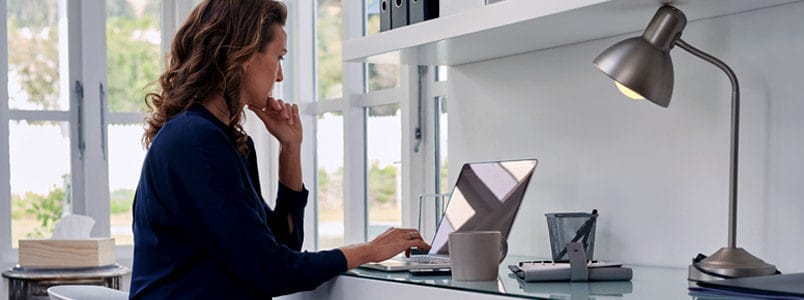If you work at home – even just part-time – you may claim a tax deduction for expenses related to your home office.

The new tax laws, however, may affect whether you are still eligible to claim those costs as a tax deduction. Read further to find out why.
Tax reform changed the home office deduction for 2018
Before the Tax Cuts and Jobs Act (TCJA) went into effect, you could deduct unreimbursed job expenses that exceeded two percent of your adjusted gross income on your income tax return. Unfortunately, however, that’s not the case anymore.
If you work at home as an employee – even for your employer’s convenience – you can no longer deduct your out-of-pocket expenses. The new tax law did away with deductions for unreimbursed employee expenses. Previously you would have claimed any home office costs on Schedule A as Miscellaneous Deductions. But before you start to stress thinking you lost a tax benefit – look at it this way. The increase in the standard deduction for all filing statuses is expected to make up for the change. For more on that, click here.
If you’re self-employed, however, the story is different. Nothing changed for you. You can still claim the home office deduction for qualifying costs, whether you use the actual expenses or the simplified method. The deduction decreases your business income, and therefore your gross income.
Qualifications to claim the home office deduction
You may qualify to claim the home office deduction if you regularly use a portion of your home for your business. You must file Schedule C, Sole Proprietorship with your tax return to take the deduction.
The definition of a home office
To be considered a home office, the area must be regularly used exclusively for your self-employed business. It also must be your primary place of business or a separate structure used in connection with your business. Although, there is no requirement that it be partitioned off from other areas with a wall or other barrier.
There are sometimes exceptions to the rule, however. For instance, in-home daycare businesses don’t have to meet the exclusive use test. To qualify for that exception, you must meet two different requirements. The first is that you must provide daycare for children, people 65 years or older, or people who are physically or mentally unable to care for themselves. The second requirement is that you must have a license, certification, registration, or approval as a daycare center under state law (or been granted an exemption from needing one).
Home office business expenses
You can deduct direct expenses related to your office, including maintenance, furniture and equipment, supplies, and so on. You can also deduct a portion of your expenses related to your home. Those expenses can include mortgage interest, insurance, utilities, maintenance, property taxes, and security system fees.
For the portion of your home-related expenses, the rule is to compare the amount of office space with the total space of your house. For example, if your home office is 150 square feet and your home is 1800 square feet, you could claim 8 percent of your home-related expenses on your tax return (150/1800).
Simplified method
As an alternative to computing the actual costs of your expenses, the IRS offers a simplified method to make the home office deduction calculation easier. With the simplified method, you can claim a deduction of $5 per square foot, for up to 300 square feet. You can choose between the simplified method and tracking actual expenses every year.
As previously stated, the ability to deduct actual expenses or use the simplified method is no longer available to traditional employees who work from home. The option is only open to individuals who are self-employed.
The new tax law and remote workers
If you are an employee working remotely, this new tax law affects you. You will not be able to deduct those expenses on your 2018 tax return.
If you work as an independent contractor or freelancer, on the other hand, the law doesn’t change for you. You can still plan to deduct those costs when you prepare your tax return.
The home office deduction and audits
Taking the home office deduction does not greatly increase your chances of being audited. But as always, a good rule of thumb is to keep excellent records of your income and expenses. That means right down to every last penny spent or earned. File away all of your receipts for safe keeping so you have them as backup proof in the event of an audit.